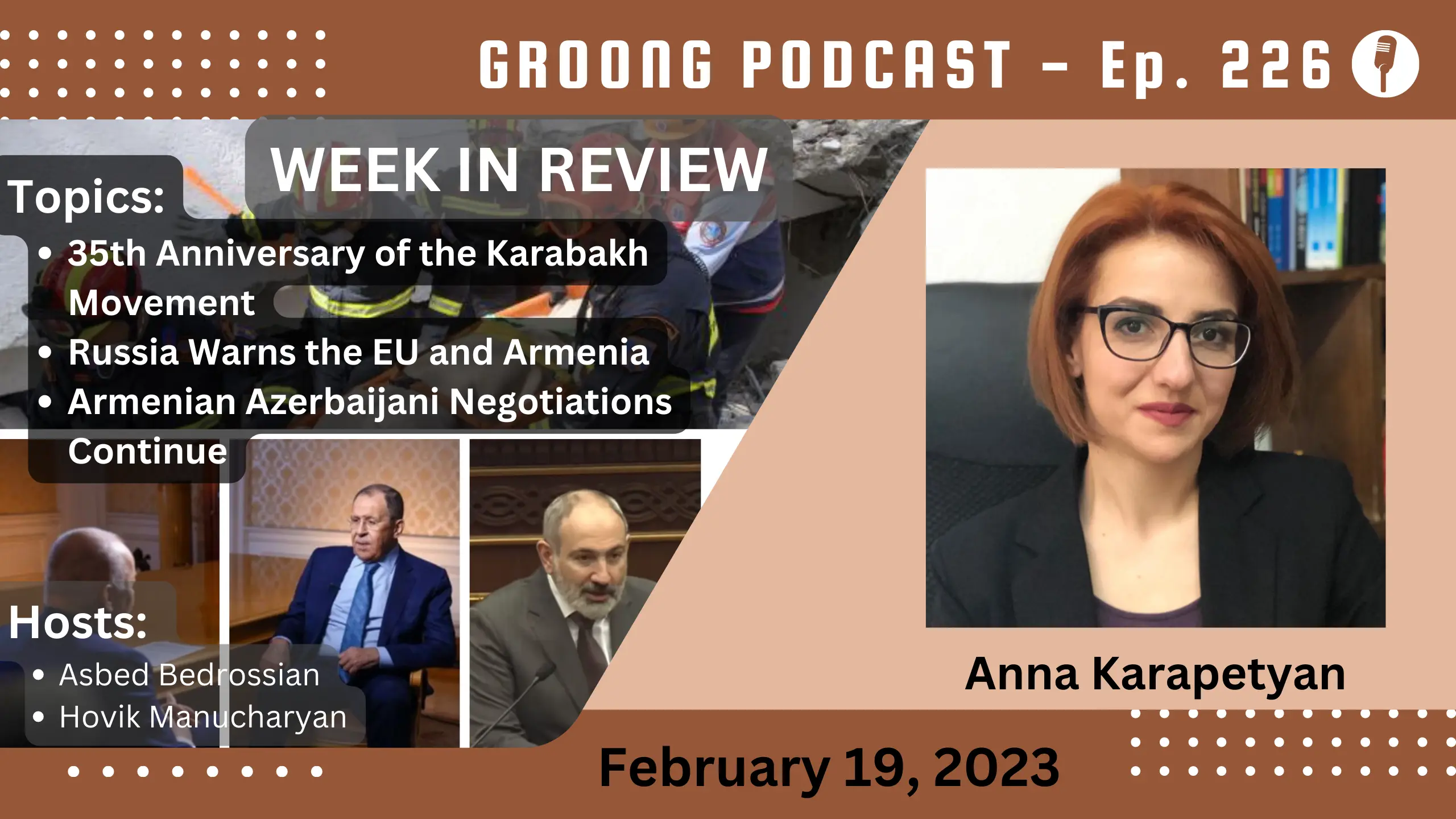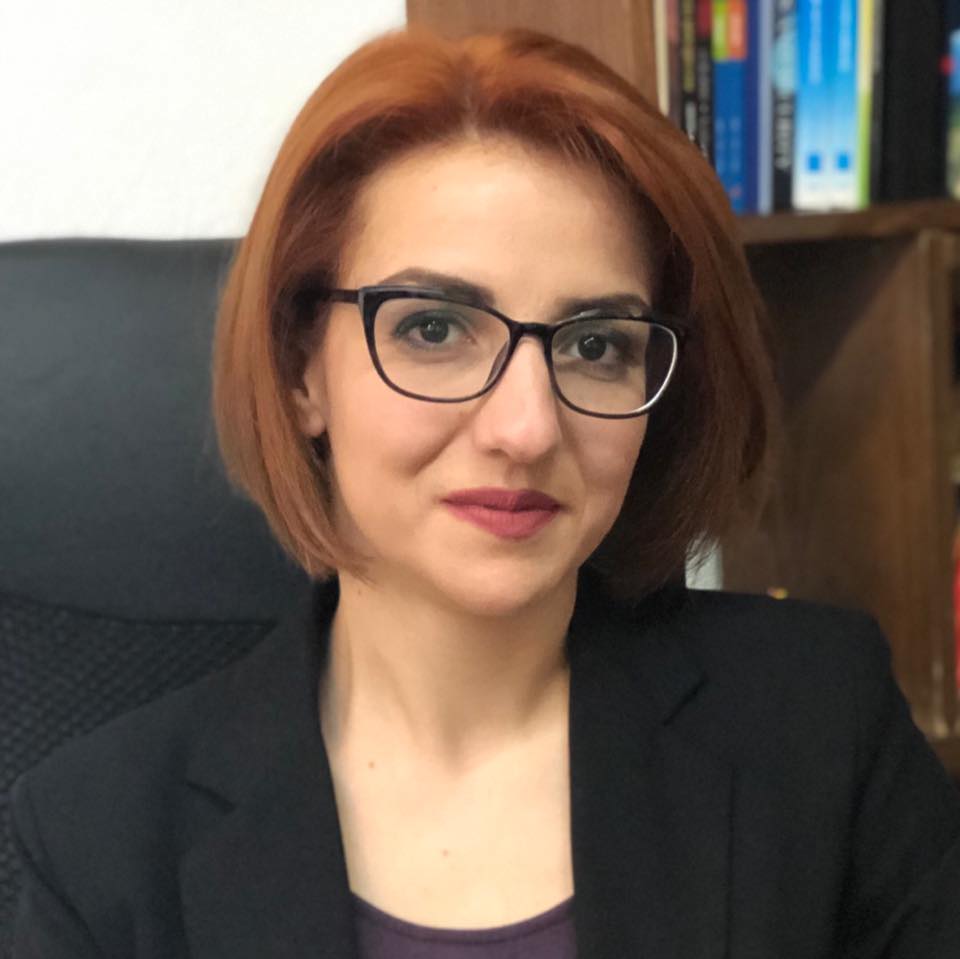
Guest:
Topics:
- 35th Anniversary of the Karabakh Movement
- Russia Warns the EU and Armenia
- Armenian Azerbaijani Negotiations Continue
- Personal topics
Episode 226 | Recorded: February 19, 2023
Show Notes
35th Anniversary of the Karabakh Movement
That today is the 35th anniversary of the Karabakh movement, which started the entire struggle for independence and self-determination of Artsakh, and finally its secession from a crumbling Soviet Union, the same as Armenia, Azerbaijan, and all the other states.
This anniversary is being celebrated in precarious circumstances, with Artsakh under siege, Armenia proper in some kind of stupor or apathy, and an equally inactive Diaspora.
Questions:
- Thoughts about this milestone?
Russia Warns the EU and Armenia
The EU approved an expanded, two-year civilian monitoring mission to the borders of Armenia. An EU observer mission of 100 staff, only 50 of which are actual observers, will be stationed along the Armenian borders with Azerbaijan, including those with Nakhijevan. Their HQ will be in Yeghegnadzor (Vayots Dzor province). So that is 50 people for 1,000 kilometers of border.
The Armenian government was enthusiastic about this and FM Mirzoyan said that the mission will contribute to “peace and stability” in the region. Meanwhile, Armenia has rejected a proposed CSTO mission to Armenia, which reportedly also included an armed component.
Iran diplomatically signaled its dissatisfaction with the EU mission, saying that extra-regional players could destabilize the region. Russia in its turn was much more vehement expressing displeasure and deploring this mission.
Armenia seems to have further inflamed Russia, Iran and Azerbaijan with statements that crossed all of their assertions. First, Armenia said that Iran is actually not opposed to the EU mission, something which the Iranians had to deny. Then Pashinyan said that the EU monitors will not only monitor the borders with Azerbaijan, but also Russian troops in Armenia and the peacekeepers in Artsakh, and he justified this by saying that Azerbaijan has been complaining to the west that Armenia and Russia are conspiring to attack it.
This was refuted by the EU, and also Russia, who said that Russia had never heard Azerbaijan express concern or fear or being attacked by Russia. Russia’s State Duma speaker Vyacheslav Volodin also issued a stern warning to the EU and Armenia, saying that consequences of leaning towards the EU could lead to “losing the country”.
Question:
- Can you explain why Russia has issued such a dire warning?
Armenia has continued rejecting CSTO missions to its borders. Last week Lavrov said that a mission could be deployed within a day or two, but Armenia’s government has expressed doubts about it, and also given various excuses why the CSTO is not a desirable mission. For example, they’ve said that since the CSTO countries have not recognized Azerbaijan as the aggressor, and do not recognize Armenia’s borders, then they would not be able to carry out the mission properly.
Questions:
- Armenian leadership states that they feel betrayed by its alliances, bilaterally with Russia, and through the CSTO. But on the flip side, Russia is also expressing feelings of betrayal by Armenia. Can you discuss the dynamics of this relationship souring?
- Why is it so important for Armenian leaders to get CSTO explicitly to recognize Azerbaijan as an aggressor, when I don’t think the EU has done the same either.
- How does the Ukraine crisis figure into this picture?
- Is there a way to repair the relationship?
Gas Politics
On February 18, Gazprom Armenia announced that gas supply to Armenia will be restricted due to disruptions in the North Caucasus-Transcaucasia Transit Gas Pipeline, which is used to deliver natural gas to Georgia and Armenia. Gazprom’s announcement mentions that gas supplies to gas stations that provide CNG will be limited. Gas supply was restored by Feb. 20.
While some circles were quick to make unverifiable accusations that Russia was restricting the gas deliberately, we should also mention that Russia has used provision of cheap natural gas as a political leverage, including recently with Moldova.
However, given Armenia’s recent assertive pro-western positioning, it is an important opportunity to remember that Armenia is quite dependent on cheap Russian gas, using up around 2B cubic meters per year at a price of $165 per thousand cubic meters. This is about 1/10 of the current market price. Economist and former prime minister Hrant Bagratian says that if Armenia were forced to pay market price, Armenia would forfeit a “Russian subsidy equal to $2.6B dollars per year.”
Question:
- How likely is the possibility of Russia using natural gas as leverage against Armenia?
Armenian-Azerbaijani Negotiations Continue
Armenia-Azerbaijan Negotiations
Talks about a “peace treaty” continue. After his visit to Turkey, Ararat Mirzoyan said that Armenia has reviewed the next successive iteration of Azerbaijani proposal and submitted its counter-proposals.
Questions:
- Who is acting as a conduit between the two countries, in transferring these proposals?
- Oposition members Armen Ashotyan suspects that Ankara is now fulfilling this role. Is this likely?
Munich Security Conference
Over this past weekend the annual Munich Security Conference took place and both Pashinyan and Aliyev attended. Each of them met with EU co-president Charles Michel, and they also had a trilateral meeting with US secretary of state Anthony Blinken.
Note:
- In the initial agenda (as of Feb 16) Aliyev is mentioned in the agenda as a participant in the “Moving Mountains? Building Security in the South Caucasus” panel discussion along with Georgia’s Prime Minister Gharibashvili. However, the agenda was modified at the last minute to include Pashinyan in that panel session.
The focus of the conference was heavily on the one-year anniversary of the war in Ukraine, and French president Macron said that the ongoing conflicts in the South Caucasus and other places can not be ignored. He mentioned Nikol Pashinyan, referring to him as his friend and that he was always going to support him.
With comments from Macron, and meetings with Michel and Blinken, there is a very clear emphasis on western solutions in the South Caucasus.
Questions:
- Pashinyan and Aliyev participated in the session called “Moving Mountains? Building Security in the South Caucasus”, which was broadcast publicly. What points were made by both sides?
- We heard Macron also make very pro-Armenian statements during the 44-day war. Has anything substantive come out of these meetings?
Russia was not invited to the Munich conference by Europeans who sometimes think they’re at war with Russia and other times deny that. And Pashinyan’s rejection of Russia and the CSTO in favor of European geopolitical interests is obvious to all the analysts we talk to. Meanwhile, Aliyev says that he’s OK with whoever can help him get Armenia to sign his so-called “peace treaty”.
Questions:
- What is in this document currently, and is there talk of conceding a corridor through Armenia?
- Alyev said that the meeting with Armenia was constructive and that the Azerbaijani side is reviewing the Armenian proposal. What is your assessment about how close the sides are to signing something?
Aliyev continues to rant about Ruben Vardanyan, calling him a “Russian citizen, a criminal, and oligarch”. Interesting words coming from someone who is at the center of a new scandal every year, that gets published by international anti-corruption watchdogs. Aliyev said that Azerbaijan will negotiate with Armenians in Karabakh if and only if Ruben Vardanyan leaves.
Questions:
- What is the reason for Aliyev’s fixation with Ruben Vardanyan?
- Many Pashinyan supporters say that direct negotiations between Baku and Stepanakert is a victory, but realistically speaking are these going to be equal negotiations? For instance, do you think that anything around the status of Artsakh could be under negotiations?
Artsakh Negotiations
We are now at Day 71 of the #ArtsakhBlockade, which we’re covering regularly.
Recently National Security Council chairman Armen Grigoryan, in talking about the latest iteration of the so-called “peace agreement” being negotiated between Armenia and Azerbaijan leaked that the Armenian draft “Could Mention Nagorno Karabakh”.
A couple of days from now, on Feb. 22nd, the International Court of Justice is expected to yield a decision to Armenia’s request for temporary measures against Azerbaijan, to open the Lachin/Berdzor corridor. On the same day it is also expected to release their decision about Azerbaijan’s complaint.
Questions:
- What can be expected of this? Is the scheduling of the decisions on the same day a bad omen about European both-sidism?
Topics from the Panelists
- Hovik - About all the commemorations that the Armenian Government denies its people.
- Anna - About Armenia’s readiness for a major earthquake. And about upcoming Erablur.am website.
Wrap-up
We hope you found our Week in Review helpful. We invite your feedback and your suggestions, you can find us on most social media and podcast platforms. Thanks to Laura Osborn for the music on our podcasts.
Guests

Anna Karapetyan
Dr. Anna Karapetyan is the Director of the Insight Analytical Center for Applied Policy and Research. She has a PhD in political sciences, and is a lecturer at the Russian-Armenian University.
Hosts

Hovik Manucharyan
Hovik Manucharyan is an information security engineer who moved from Seattle to Armenia in 2022. He co-founded the ANN/Groong podcast in 2020 and has been a contributor to Groong News since the late 1990s.
Disclaimer: The views expressed by Hovik Manucharyan on the ANN/Groong podcast are his own and do not necessarily reflect the opinions of his employer or any other organization.

Asbed Bedrossian
Asbed is founder of the Armenian News Network Groong and co-founder of the ANN/Groong podcast.